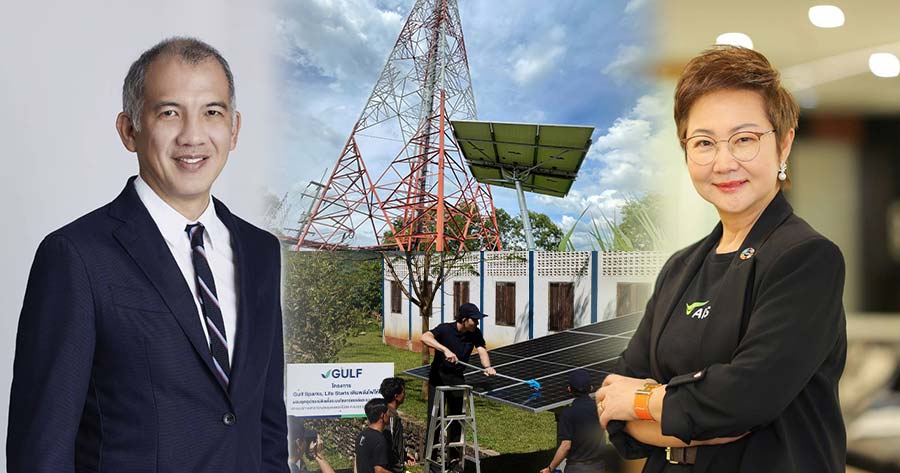GULF and AIS have united to offer access to energy and digital technology through the ‘Gulf x AIS Solar Synergy: A Spark of Green Energy Network’ project. This initiative aims to reduce inequality, create educational opportunities, and enhance healthcare services. It also focuses on fostering the growth of the community economy and improving the quality of life for Thai people in remote areas. The project includes the installation of solar panels to provide clean energy from sunlight. Additionally, communication systems will be set up using mobile phone base stations to connect remote areas. The first implementation will be carried out in Ban Dokmai Sod, a village in Mae Usu, Tha Song Yang District, Tak Province, with plans to expand to other regions.
Mr. Tanon Tantisunthorn, Chief Infrastructure and Logistics Business Officer of Gulf Energy Development Public Company Limited, and Ms. Saichon Submakudom, Head of Public Relations and Business Relations Business Unit at AIS, jointly stated, “The ultimate goal of GULF and AIS is to leverage the business capabilities of each company to elevate the quality of life for the Thai people, promoting equality and inclusivity. We are committed to supporting the government’s mission to improve the quality of life for the public. This collaboration is driven by the synergy of knowledge and expertise from GULF, specializing in modern renewable energy development, and AIS, an expert in communication and digital technology. Together, we aim to provide energy and communication infrastructure, such as electricity and mobile phone signals, to Thai people in areas where basic public utilities are hard to access.”
GULF will deliver solar power systems to various communities based on their specific needs and challenges. This includes addressing healthcare issues, such as disease prevention and treatment, as well as providing electricity for educational purposes, lighting, water filtration systems, and water pumping systems for agricultural and domestic use. The initiative also involves imparting basic knowledge about clean energy, maintenance of solar panels, and environmental conservation.
On the other hand, AIS will implement a telecommunication system powered by solar energy to enable communities to efficiently utilize communication services. This initiative will facilitate learning through various online knowledge sources and complement it with access to health consultation systems such as ‘Telemedicine’. Additionally, it will be utilized for promoting tourism and community products through online networks, thus helping to create job opportunities for local residents. The first pilot project has been launched in Ban Dokmai Sod, Mae Usu, Tha Song Yang District, Tak Province. This mountainous village, lacking in electricity, has a population of about 700 people across 160 households. Most residents are farmers, primarily cultivating corn.
Although Ban Dokmai Sod is only 40 kilometers away from the Tha Song Yang district center, the journey is challenging due to the rough dirt roads and winding mountain paths. It takes over three hours to travel into the area. Especially during the rainy season, the routes become almost entirely cut off from the outside world. Consequently, the local residents cannot access public utilities and various communication systems, including immediate medical care in case of emergencies. Therefore, we have chosen this location as a pilot area before continuously expanding the initiative to other regions across every part of the country.
“Because both organizations recognize that electricity and communication systems are essential public utilities, it is crucial that people in every area have equal and widespread access. This belief serves as the inspiration for all employees who wholeheartedly support this mission under their respective roles and responsibilities. The project is also deemed in line with sustainable development policies arising from the management of renewable energy and the development of digital service infrastructure, capable of generating benefits across the economic, social, and environmental aspects.” Mr. Tanon and Ms. Saichon reiterated.





